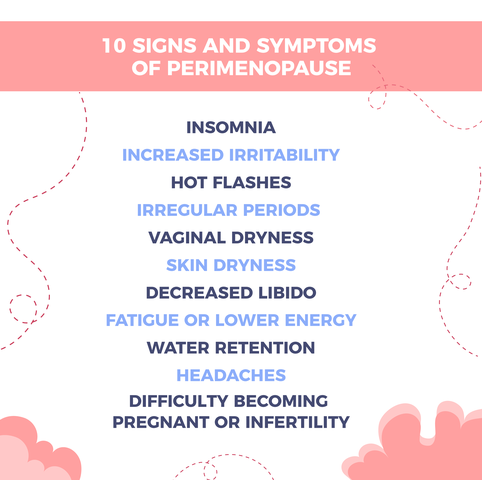Female Hormonal Imbalance Over 35 Years
This post is part 2 in a three-part series about women’s hormones at all ages. Click here to read part 1 about young women, and stay tuned for the article on menopause/post-menopause soon!
Around the age of 35 and up until around the age of 50 is a time of significant hormonal changes for women. For those that are still wanting to become pregnant and seeking natural fertility treatment, this can be stressful. If you are not wishing to become pregnant, you are certainly striving for a smooth and symptom-free shift into perimenopause, menopause and postmenopause.
The good news is that there are several common root causes of irregular periods and hormone imbalance in older women, and there are also solutions. Testing is an important factor when it comes to understanding what is happening throughout perimenopause (including early perimenopause) and beyond, as each woman’s body is unique and needs a personalized plan to obtain the best and most effective support possible.
Signs and Symptoms of Perimenopause
Before diving into the causes, let’s first take a look at the definition and signs of perimenopause.
Period changes after 35 (perimenopause) are characterized by fluctuating estrogen and dropping progesterone levels, largely due to decreased frequency of ovulation. More specifically, progesterone in the luteal phase (the second half of your cycle) typically begins to decrease, estradiol remains the same, FSH increases and serum inhibin B begins to decrease.
Periods more often than not become shorter, but it’s also normal so see changes in the amount of time between periods, and some months you might skip a cycle completely.
Perimenopause symptoms can begin as early as 35 years, and might include the following:
Insomnia
Increased irritability
Hot flashes
Irregular periods (as described above)
Vaginal dryness
Skin dryness
Decreased libido
Fatigue or lower energy
Weight gain or weight loss resistance
Water retention
Headaches
Difficulty becoming pregnant (infertility)
Heavy periods
Increased PMS
If some or all of these symptoms ring true for you, you could be showing signs of perimenopause. Thankfully, there are several root causes and ways to support symptoms and ensure your hormones remain balanced as you get older.
Causes of Irregular Periods in Perimenopause
Symptoms can be very different woman to woman during this stage in life. Also, causes of irregular periods and hormonal imbalances can also vary widely. Regardless, it can be incredibly frustrating, frightening and sad — especially in the case of infertility — to struggle with symptoms that come from these imbalances.
Here are some of the most common causes of irregular periods and perimenopausal symptoms in older women, and what can be done.
A) Egg Quality in Perimenopause
What is happening: While declining egg quality can also be related to diet, lifestyle and high stress, age and hormonal imbalances often play a big role. When you are over the age of 35, egg quality starts to decline, and this leads to a natural decrease in hormones.
What to do: However, more recent research has shed light on ways to improve egg quality, instead of simply accepting it as a cause of infertility or other hormonal problems. Good nutrition, improved sleep, testing and targeted supplementation can greatly help. (1)
B) Estrogen Dominance in Perimenopause
What is happening: A common pattern during this stage of life is estrogen dominance, largely due to the natural decline in progesterone in the 10-15 years leading up to menopause. This means that your levels of estrogen and progesterone are not balanced anymore. During a woman’s peak reproductive years, estrogen levels stay fairly consistent cycle to cycle, and levels tend to remain stable until the last cycle that occurs with the onset of menopause.
Symptoms include: spotting, heavy periods, PMS, headaches, anxiety, depression, insomnia and infertility.
C) Low Hormone Production in Perimenopause
What is happening: Another common pattern during this time is overall low hormone production, which can be linked to stress or the many root causes of brain fog and brain inflammation. “Low hormone levels” are often referring to steroid hormones such as cortisol (the body’s primary stress hormone produced by the adrenal glands), estrogen and testosterone.
Symptoms include: low energy and libido, sugar and carb cravings and vaginal dryness, among others.
What to do: To learn more about the causes and symptoms of low hormone production, check out this article. Testing using the DUTCH test complete (Dried Urine Test for Comprehensive Hormones) is an excellent approach to getting the information you need, and I’ve had incredible success with this panel in my practice with perimenopausal women.
D) Nutrition and Weight Gain In Perimenopause
What is happening: Hormones require the right nutrition and healthy digestion for proper production and function. A diet high in refined flours and sugars has been shown to be a root cause of systemic inflammation and weight gain. (2) Sugar causes a natural spike in the hormone insulin, and this can contribute to a negative alteration in the ratio of progesterone and estrogen, among many other problems.
Dairy and gluten are other common triggers for inflammation and hormone imbalances, as are environmental contaminants such as xenobiotics, pesticides, herbicides and other toxins that act as hormone disruptors.
What to do:
Eat a clean diet: Along with removing these potentially toxic foods outlined, you’ll want to replace them with whole, hormone-supporting foods. Key dietary players include plenty of healthy fats, adequate protein, leafy green and cruciferous vegetables, flax seeds and plenty of filtered water. Always opt for organic non-GMO foods whenever possible.
Support your digestion: Even with the healthiest of diets, proper digestion is key for breakdown and absorption of nutrients, and elimination of toxins. An inability to properly digest the foods you eat, along with a potential imbalance in the gut microbiota can also contribute to irregular periods and hormonal imbalances. Consider a high quality digestive to support healthy digestion and hormones.
Supplement key nutrients: While striving to eat nutrient-dense foods all day long, it’s also essential to supplement in this day and age. Environmental toxins and stress increase demand for vitamins while soil quality is worsening and food is not as nutritious.
To this end, we offer the Foundations Collection. This daily kit includes three well-absorbed, high-quality items that lower inflammation and supply many of the nutrients you need to both manufacture and detoxify hormones. Try one serving a day of each item in the kit, plus maintain a good diet, sleep and exercise routine, and see what changes in your cycle! Click here to try it out.
E) Detoxification in Perimenopause
What is happening: A lesser-known root cause of hormonal imbalances as you age is an overburdened liver. Proper detoxification is foundational during perimenopause and beyond, as the body needs additional support to detoxify spent estrogen and avoid the common scenario of recirculation, which adds old estrogen back into your system, allowing it to recirculate and raise your estrogen levels even higher. High estrogen might be a potential cancer risk, as well. (3)
Simply put: when the liver gets bogged down with inflammatory and toxic foods, environmental contaminants such as plastics, medications and other metabolic waste products, it can’t keep up with production and elimination of hormones.
One primary detoxification process is called methylation, which eliminates metabolized hormones from the body. Poor methylation can contribute to impaired production of melatonin for sleep (which can cause both chronic and acute insomnia), neurotransmitters that play a role in anxiety and depression, antioxidants and an increase in estrogen.
What to do: Nutritional strategies to improve the levels of detox-supporting nutrients include emphasis on fibrous and cruciferous vegetables like broccoli, cauliflower, brussels sprouts and kale, among others. Plenty of green leafy vegetables, adequate protein, healthy fats and proper hydration are also key.
Broccoli sprouts are a detoxification superstar due to their high level of a phytonutrient called sulforaphane, and can be enjoyed over salads or other dishes. For more information on a comprehensive detox diet, check out this article.
Why Testing is Key for Perimenopause
“Don’t guess, test!” Hormonal imbalances and irregular periods often have some common underlying causes, but every woman’s body is unique. The same symptoms can arise from vastly different hormonal issues, so going from symptoms alone is not wise. (For example, you can experience some of the same symptoms with both high estrogen and low estrogen.)
In my practice, we’ve found that the DUTCH test is extremely effective for discovering progesterone deficiencies, low overall hormone levels, poor detoxification and even certain nutrient deficiencies. With many female hormone tests on the market, this one is far and away the most valuable option I’ve found, and one used by many integrative medical practitioners.
Whether your goal is to improve sleep, decrease perimenopause anxiety, lose weight, gain energy, boost detoxification or have a baby with natural fertility options, the DUTCH test can truly make a world of difference.
Check out the DUTCH Complete Hormone Test
The DUTCH tests for many hormones and their metabolites and pathways, so it gives a clear picture of what your hormones are doing so we can create a plan to get you back on track!
It tests for:
Estrogen
Testosterone
Progesterone
DHEA
Cortisol
Melatonin
Some vitamin markers
Some neurotransmitters
Oxidative stress markers
Plus, you will have the option to get your results reviewed with our custom consultation. You’ll get an individualized treatment plan with food and supplement recommendations designed to bring your body back into balance.
Check out the DUTCH Complete Test here.
Do You Want a Complete Picture of Your Health?
We used to offer our ‘Big Three’ testing package, which includes our three most popular functional tests to provide a clear snapshot of how your body is working overall:
the DUTCH test
the GI-MAP test (digestion)
a complete thyroid panel
You also have the option to meet our functional coach to go over all the results and make a customized plan for your needs.
Bridgit Danner, LAc, FDNP, is trained in functional health coaching and has worked with thousands of women over her career since 2004. She is the founder of Women’s Wellness Collaborative llc and FunctionalDetoxProducts.com.
Check out her easy 5-Day DIY Detox Guide here!




